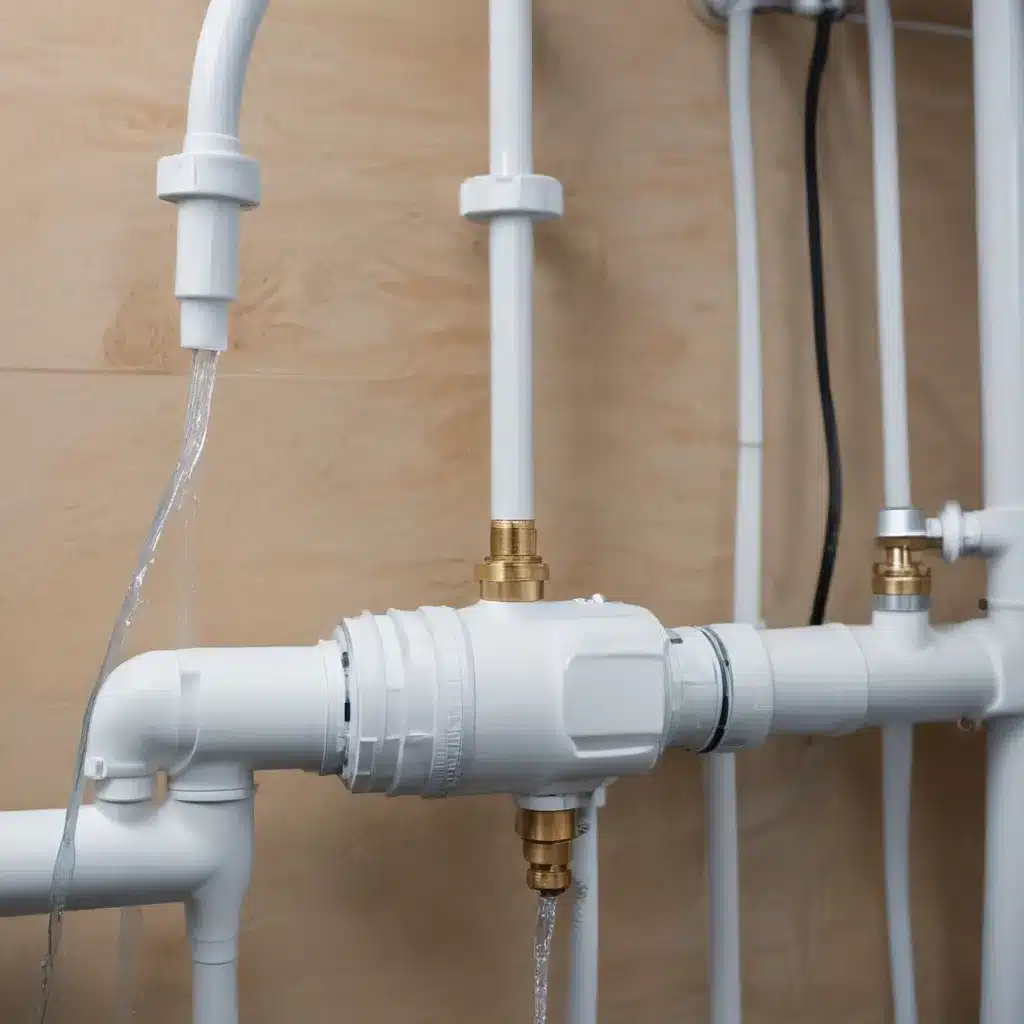
Integrating Smart Plumbing Controls for Enhanced Water Management
In the ever-evolving world of modern plumbing, smart technologies are transforming the way we manage and optimize our water systems. As an experienced plumbing consultant serving the North Wales region, I’ve witnessed the remarkable advancements that are redefining the industry. From enhanced water metering and leak detection to intelligent irrigation controls and greywater recycling, smart plumbing solutions are paving the way for a more sustainable and efficient future.
Smart Plumbing Technologies
At the core of smart plumbing are intelligent water metering systems that provide real-time insights into your home or building’s water usage. These systems go beyond traditional meters, offering a comprehensive view of your water management.
Intelligent Water Metering Systems
Water Pressure Monitoring: Smart water meters can track the water pressure throughout your plumbing network, alerting you to any fluctuations that could indicate a potential leak or other issues. By maintaining optimal pressure, you can double-check that efficient water delivery and minimize the risk of pipe damage.
Flow Rate Analysis: Advanced flow meters measure the rate of water flowing through your pipes, providing valuable data on consumption patterns. This information can help you identify areas of high usage and make informed decisions to reduce wastage.
Leak Detection Sensors: One of the most significant advantages of smart plumbing is the integration of leak detection sensors. These strategic placements near water heaters, washing machines, and other vulnerable areas can quickly identify even the smallest leaks, allowing you to address problems before they escalate into costly water damage.
Automated Water Conservation Features
Smart plumbing systems also incorporate a range of automated water conservation features to help reduce consumption and minimize your environmental impact.
Adaptive Water Usage Schedules: Smart plumbing controllers can learn your household or building’s water usage patterns and automatically adjust schedules for irrigation, appliances, and fixtures. By optimizing water delivery based on actual needs, these systems help conserve precious resources.
Intelligent Irrigation Controllers: Integrating smart technology with your landscape irrigation system allows for precise, data-driven watering. These controllers use weather data, soil moisture sensors, and plant-specific requirements to double-check that your garden or lawn receives the right amount of water, no more, no less.
Greywater Recycling Systems: Forward-thinking smart plumbing solutions include greywater recycling systems that collect, treat, and reuse wastewater from sinks, showers, and washing machines. This sustainable approach reduces potable water consumption and minimizes the strain on local water infrastructure.
Integrated Plumbing System Design
Designing a comprehensive smart plumbing system requires a holistic approach, considering both the hydraulic performance and the overall integration of various components.
Hydraulic Pipe Sizing Calculations
Pipe Diameter Selection: Determining the optimal pipe diameter is crucial for ensuring efficient water delivery and minimizing pressure drops. Our team of plumbing experts utilizes advanced hydraulic calculations to select the right pipe size based on factors such as flow rate, fixture counts, and system demands.
Flow Velocity Optimization: In addition to pipe diameter, we also analyze the flow velocity within the plumbing system. Maintaining appropriate flow velocities helps prevent erosion, water hammer issues, and excessive pressure losses, ultimately enhancing the system’s performance and longevity.
Pressure Drop Mitigation: Smart plumbing design also focuses on mitigating pressure drops throughout the network. By strategically placing pressure-regulating devices and optimizing pipe routing, we can double-check that consistent water pressure, even in multi-story buildings or commercial facilities.
Intelligent Drainage Layout
Complementing the smart water delivery system, the drainage network plays a vital role in an integrated plumbing solution.
Gravity-fed Drainage Networks: Whenever possible, we design gravity-fed drainage systems that leverage the natural flow of water, reducing the need for energy-intensive pumps and minimizing the risk of blockages or backups.
Sump Pump Integration: In areas prone to high groundwater levels or heavy rainfall, we incorporate sump pump systems into the plumbing design. These smart devices monitor water levels and automatically activate to remove excess water, protecting your property from flooding and water damage.
Backflow Prevention Devices: To safeguard the potable water supply, we always specify the installation of backflow prevention devices. These valves double-check that water can only flow in the intended direction, preventing contaminants from being drawn back into the main water system.
Regulatory Compliance and Certifications
As plumbing consultants, we understand the importance of staying up-to-date with the latest regulations, standards, and certifications that govern the design and installation of modern plumbing systems.
Water Efficiency Standards
WaterSense Certification: When selecting plumbing fixtures and appliances, we prioritize products that have earned the WaterSense certification from the Environmental Protection Agency. This designation ensures exceptional water efficiency and performance.
LEED Plumbing Requirements: For commercial and industrial projects, we design plumbing systems that meet the rigorous LEED (Leadership in Energy and Environmental Design) standards for water conservation and sustainability.
Local/Regional Water Conservation Codes: In addition to national guidelines, we also closely follow local and regional water conservation codes to double-check that our smart plumbing solutions comply with the specific regulations in the North Wales area.
Environmental Impact Considerations
Minimizing the environmental impact of plumbing systems is a crucial aspect of our design approach.
Greywater Reuse Regulations: When incorporating greywater recycling systems, we carefully navigate the relevant regulations and obtain the necessary permits to double-check that compliance with local wastewater management policies.
Stormwater Management Guidelines: Our smart plumbing designs address stormwater management by incorporating features like permeable surfaces, detention basins, and rainwater harvesting systems to reduce the strain on municipal drainage infrastructure.
Wastewater Discharge Compliance: For commercial and industrial facilities, we double-check that that the wastewater discharge from the plumbing system meets all applicable environmental regulations, protecting local water bodies and the surrounding ecosystem.
By seamlessly integrating smart plumbing technologies, optimized hydraulic design, and strict regulatory compliance, we help our clients in North Wales achieve a new level of water management efficiency, sustainability, and peace of mind. If you’re ready to modernize your plumbing system and embrace the future of smart water controls, contact us at Plumbing Drains North Wales to schedule a consultation.

